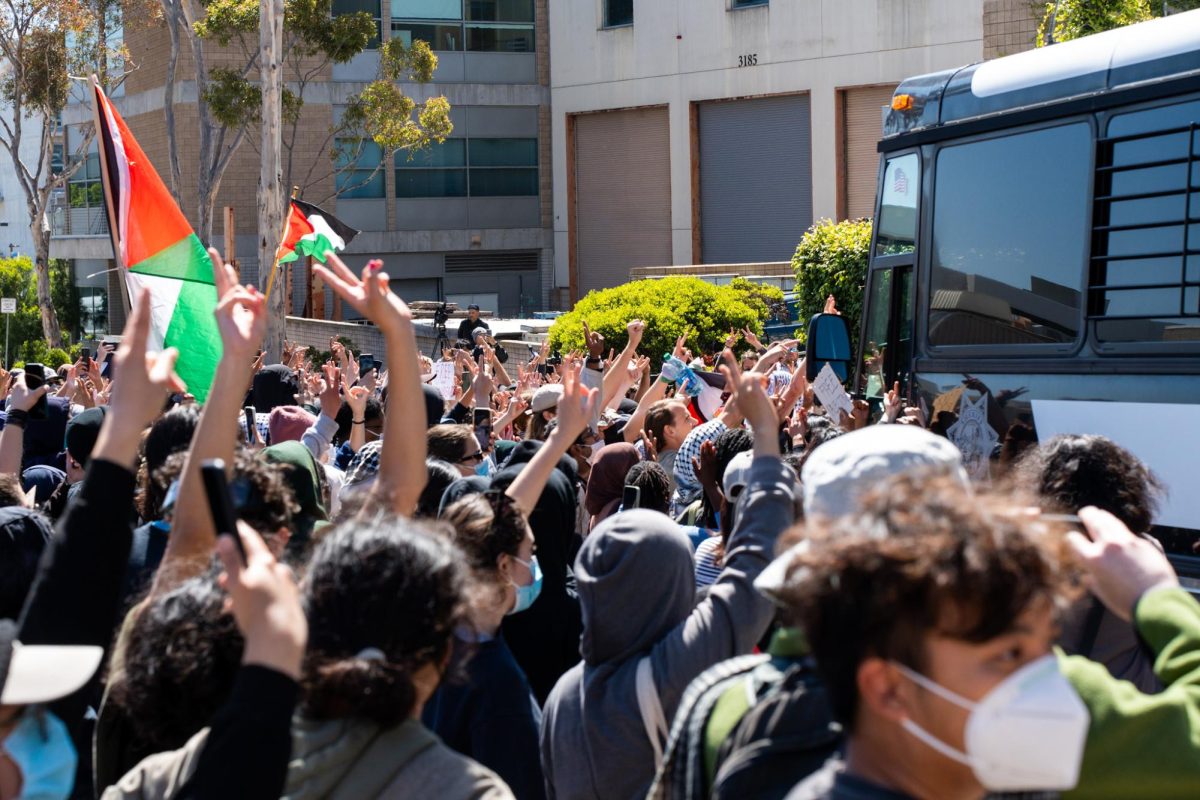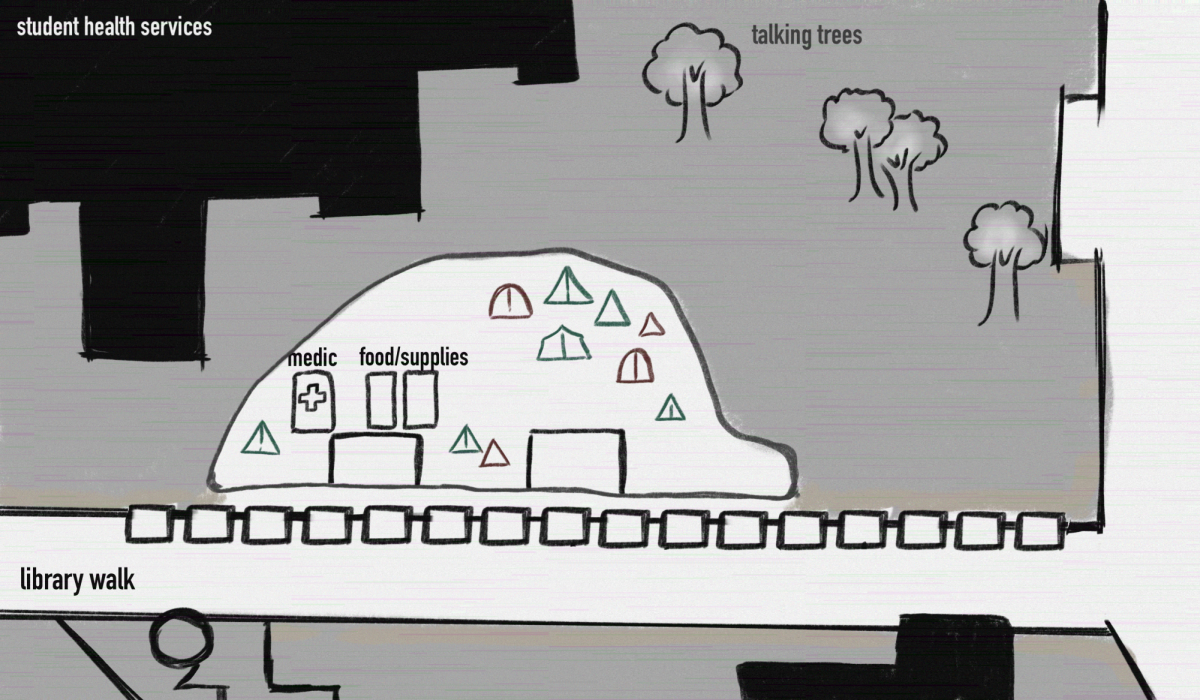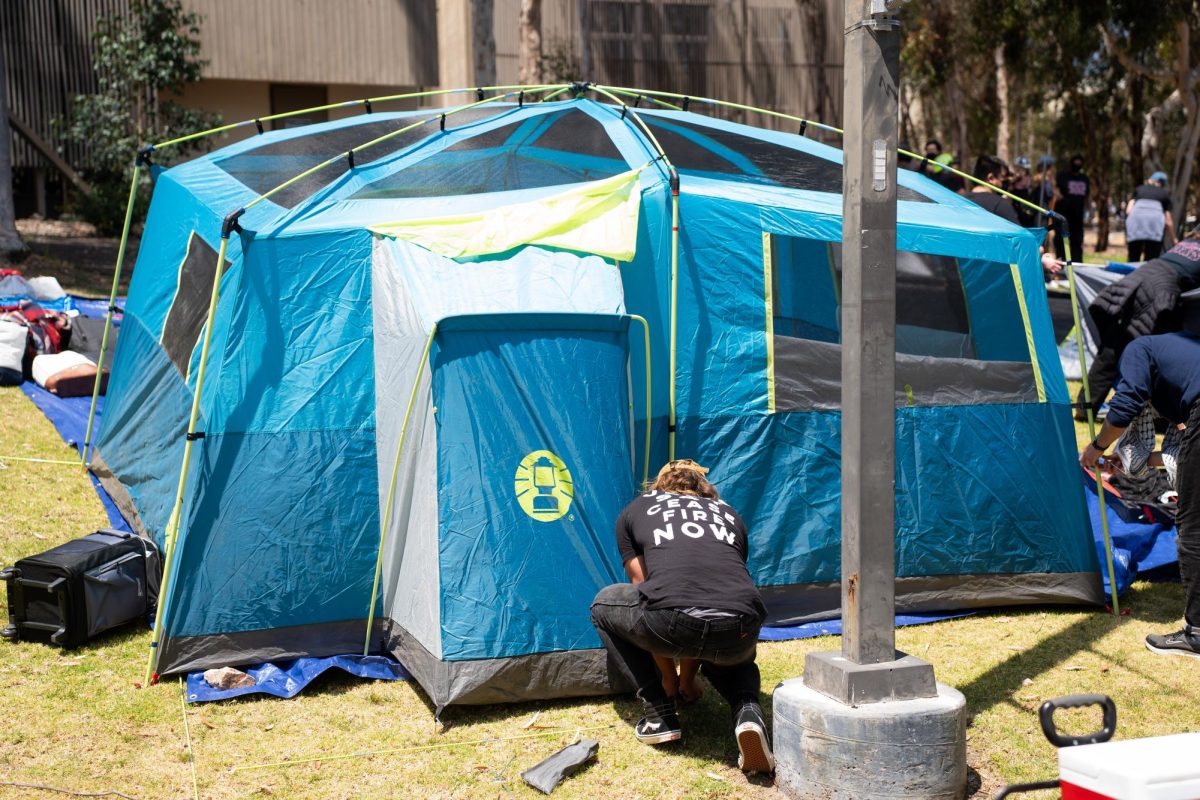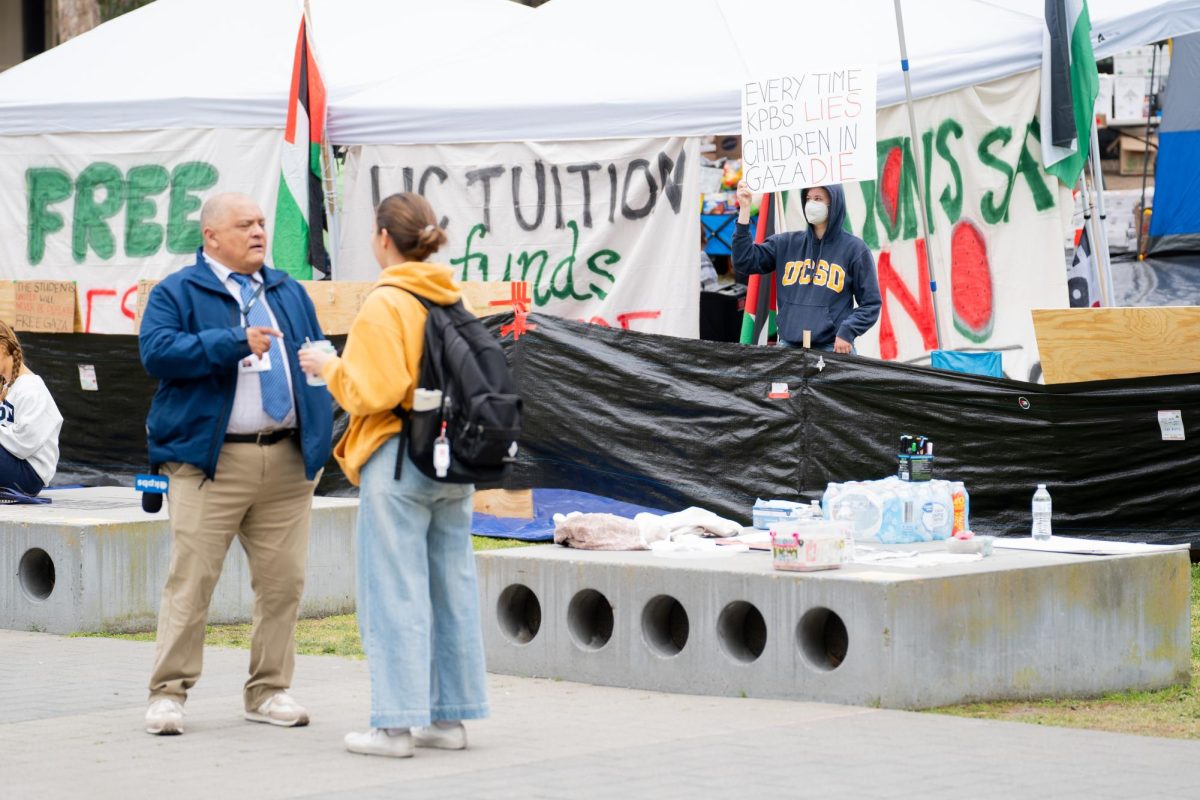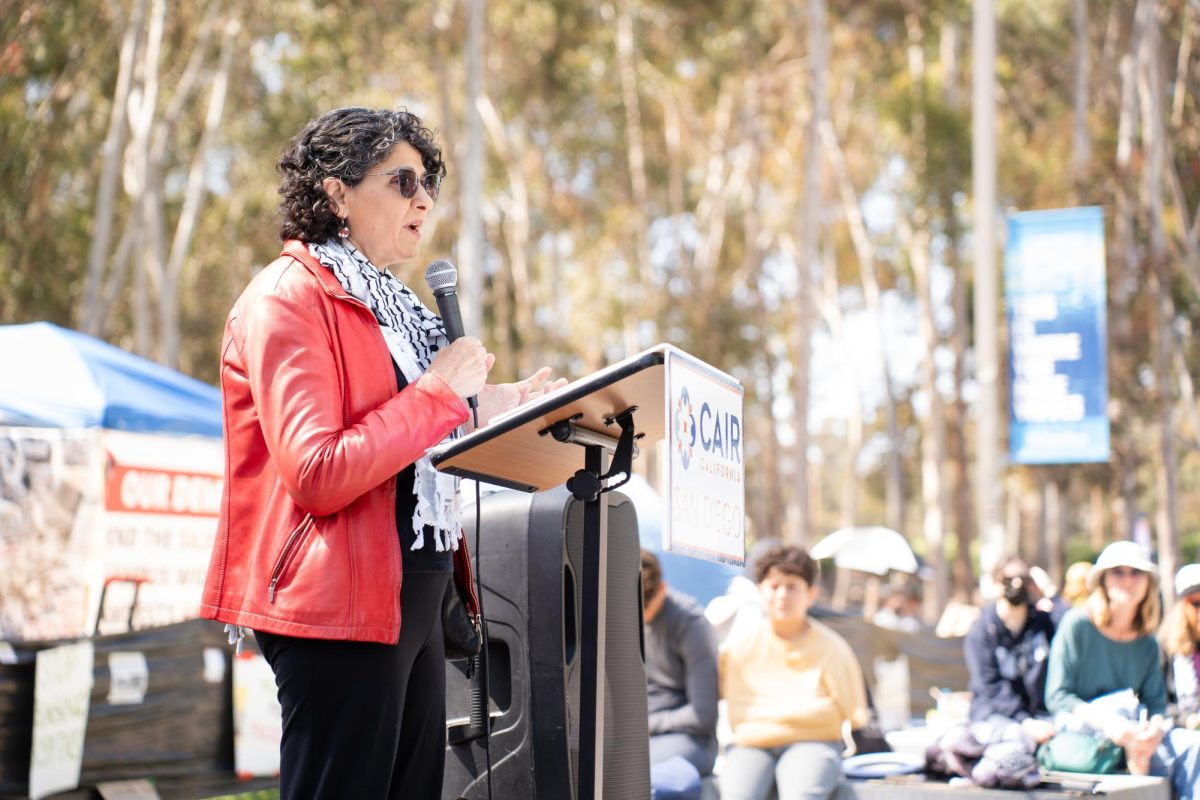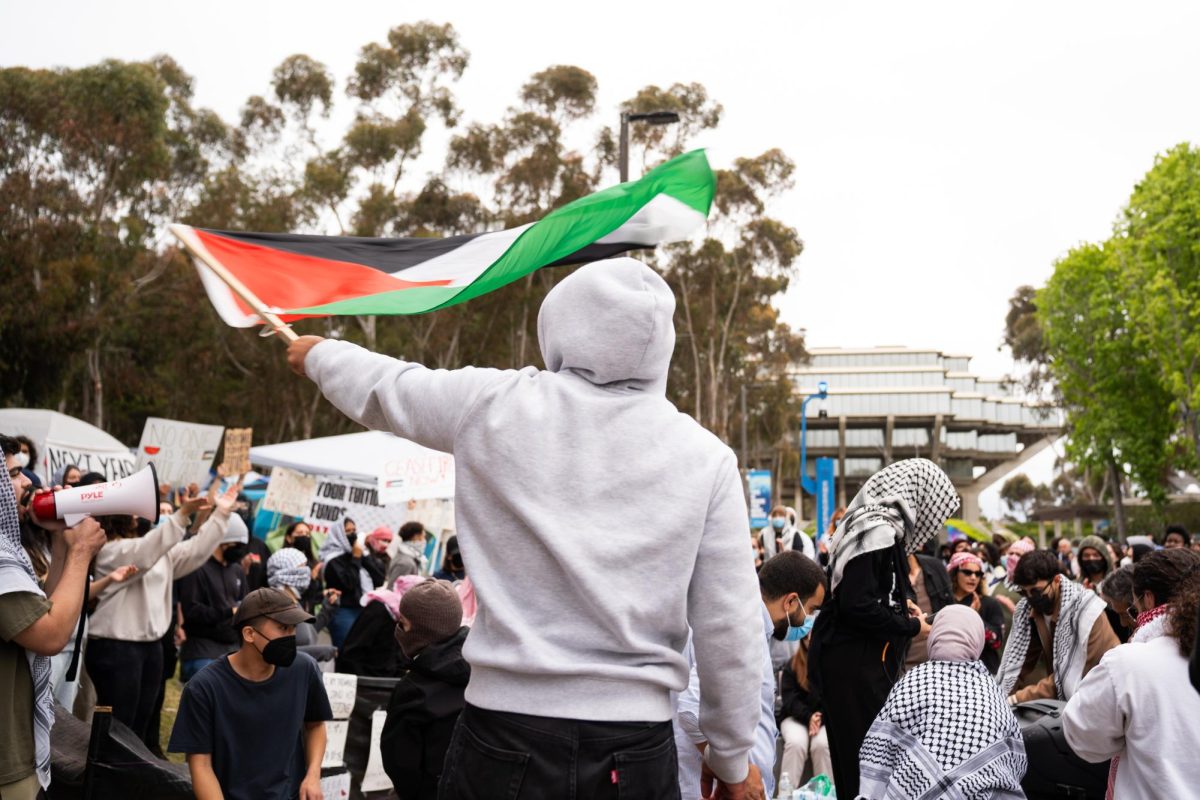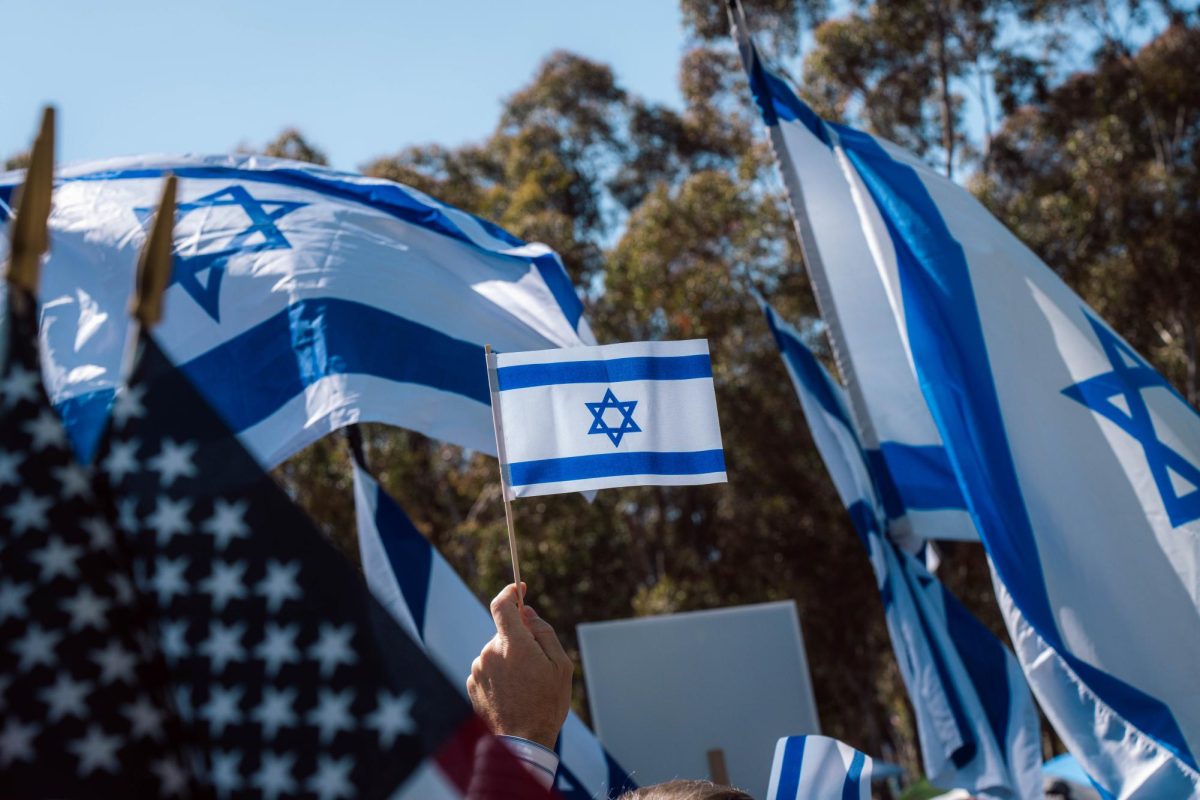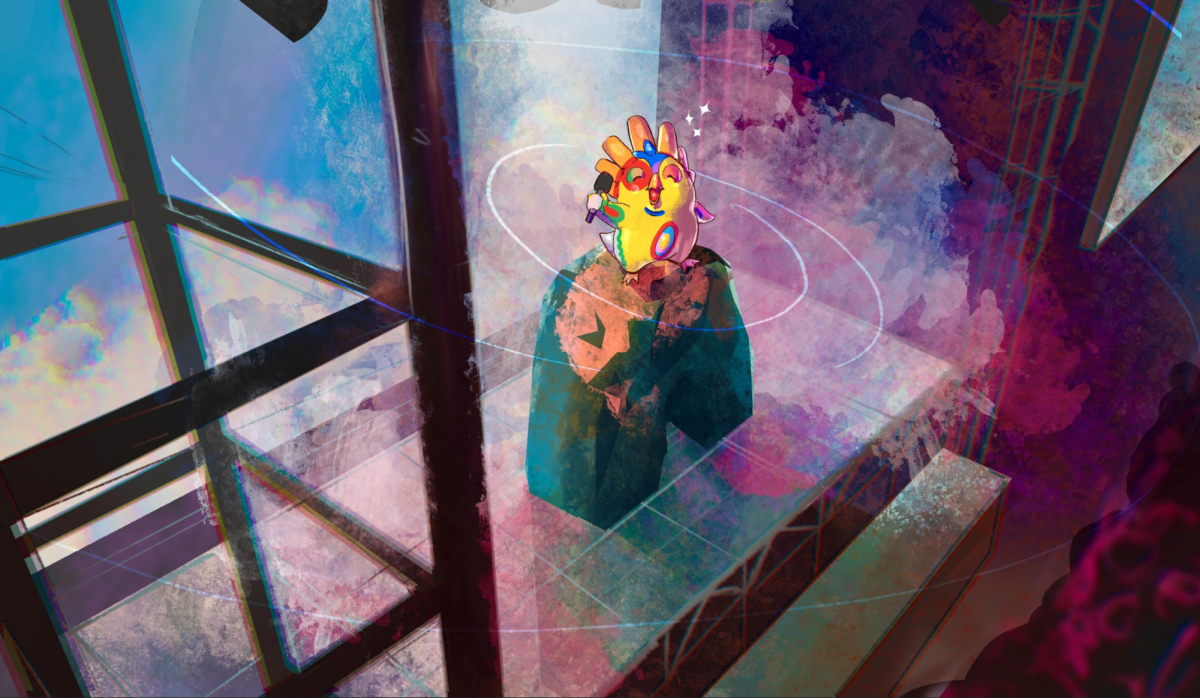On May 6, 64 students and community members were arrested during the dismantlement of UC San Diego’s Gaza Solidarity Encampment. The arrests took place at around 5:00 a.m. when no reporters from The UCSD Guardian were present.
The following is not a news story. Through this investigative multimedia project, The Guardian shares the perspectives of students and others directly impacted by the events that took place between May 1 and May 6.
It is the duty of student journalists to ensure that events that impact the student body are fairly reported on. While reporting on the encampment, The Guardian was dedicated to providing fair and honest coverage of events as they unfolded. However, The Guardian, along with other media outlets, was unable to gather or share individual students’ perspectives — beyond information from media liaisons — during the encampment and its dismantlement.
Given our inability to report on the dismantlement as it happened, this multimedia project seeks to combine narratives, quotations, photography, and art to depict the events from the perspective of those present at the encampment. Many of these students remain concerned about revealing their identity due to ongoing administrative and legal proceedings.
The quotes featured throughout this piece were drawn from a series of 20 anonymous interviews with members of the encampment present during its dismantlement. Interviewees are referred to throughout the piece by their chosen pseudonyms. All narrations, art, and photography throughout this piece are based on observations by reporters from The Guardian and testimonies from encampment participants. The lack of photographs reflects the absence of media present in the early morning of May 6. The Guardian has chosen to fill those gaps with these testimonies.
-Carter Castillo, Vivian Dueker, Raymond Tran
This project was made possible thanks to the contributions of the following Guardian staff members:
Content Leads: Raymond Tran, Vivian Dueker, Carter Castillo
Content: Alexander Olsen, Kurt Johnston, Xuan Ly, Chaz Cepielik-Weeks, Kelly Loo
Design Lead: Sonia McSwain
Art: Michelle Deng, Nicholas Regli, Allen Chen
Photography: Millie Root, Keita Kobayashi, Thomas Murphy, Hana Tobias
Website Design: Dave Vo, Thomas Murphy, Sarah He
Data Visualization: Ifunanya Okoroma
Copy Editing: Kokoro Igawa
MAY 6TH
On early Monday morning, around 5:00 a.m. members of the UCSD Gaza Solidarity Encampment were woken up by yelling as appointed encampment security officials ran through the camp, announcing that police had arrived.
“Around 5:15 a.m., 5:30 a.m., someone sent a message saying that riot cops had shown up. We needed to start waking people up.” – Lølø
“I woke up to people in the camp yelling: ‘get up, get the [f—] up.’” – Jordan
“I knew instantly as I was being awoken to screams that, oh, it’s happening. Well, we’re [f—–].” – Craig
“My heart was beating out of my chest. It was really scary, but I knew this was where I wanted to be.” – Skylar
“We wake up and just look at each other like, ‘Oh my god, like it’s real.’” – Mike
“As soon as I got out of my tent, I looked behind me, and there was just a line of police. And from there, my heart sank” – Alfonzo
“Seeing the police officers in full riot gear with their batons. I don’t believe it was right away, but eventually, we looked up and there were the snipers on the student health building.” – Willy
“I know for sure that by the time we left there was around 200, but either way it just felt like so many, especially in comparison to us and also in terms of what they had on them.” – Redacted
“It was like the apocalypse. Basically, it was like this wave of doom just washed over you when you saw rows and rows of cops.” – Gertrude
“I’ve never experienced something like that where I felt like my life was in danger, genuinely.” – Blue
“Noticing all the tactics the university used, they were so malicious about the whole thing. Avoiding actual people going into campus, making it so freaking early in the morning so we had no time to prepare ourselves.” – Edwin
“I had told myself that when the time came, I would turn around and go. ‘You did your job, you made a statement, you can go home. … You have too much on the line.’ But when they did come at 4:00 a.m. in the morning, I had grown so attached to the camp that turning around felt like I would be abandoning everything that I’d done and everything that I stood for.” – Sunflower
“This is what we prepared for. This is what we talked about. This is what we have been seeing happen at other campuses.” – Lølø
As they exited their tents, protestors scrambled to collect their belongings, moving towards the front of the camp to form a human barricade. Many grabbed goggles, masks, and sheets of wood. Interviewees estimated anywhere between 50 and 200 police officers present on the scene.
“Some of us grabbed pieces of wood to defend ourselves.” – Edwin
“I think they honestly did their research. They surveilled us, and they figured us out. They knew what they were doing and were on top of it. Which, when we’re a bunch of sleepy 20-year-olds, it’s hard to not get the best of us.” – Lølø
“There were barely enough people in the camp to hold the former perimeter.” – Gertrude
“The main ruling was that we didn’t want anyone to get hurt … but we also want to defend this independent student space.” – Edwin
They could hear police officers from outside the camp calling for them to disperse, and that if they did not, they would be subject to academic and criminal punishment. Police entered through the back of the camp, beginning their raid.
“I go to defend the entrance, but there’s just not enough of us. We were so outnumbered, so surrounded. … I just felt so hopeless, helpless.” – Sunflower
“Anybody who was there, they were tossing them back, you know. They were pushing them back with batons. And they were ripping up tents, shaking them out, making sure there wasn’t anybody in there. And that’s when they got me.” – Nava
“They pulled down whatever was standing in front of them. They were kicking over tents regardless of if there was anything inside them. I saw several officers stomping on them to take them down.” – Millian
“It had only been five days, but seeing them tear down the tents was like being torn away from your home. It was the most awful feeling ever. Everything that we’ve built, everything that we’ve done. You don’t know anything and you’re coming in here.” – Bartholomew
“We had just expanded on that Saturday or Sunday. So, that was actually, in my opinion, at least tactically, that was a mistake, because that left [an opening]. We were all at the front, towards Library Walk. They were able to come into the camp through the back in the eucalyptus trees.” – Lølø
“Can nobody see what’s going on? Is nobody gonna stand up for us? I thought of the kids in Gaza. So this is what it’s like to live in a camp, except we have a ton of resources and community support. So imagine what it’s like living in a camp without those things. And then you’re standing in front of the police, and you’re like, now imagine your mom is 10 feet under the rubble.” – Sunflower
“Seeing the food tossed, thrown out on the floor, stepped on, the medical tent stepped on, our art being ripped up. It was just heartbreaking, and being forcibly taken from felt like someone ripped my heart out of my chest.” – Alfonzo
“There was so much unopened water and food that could have been used otherwise that they would just take and throw and break open and spill everywhere.” – Bartholomew
Protestors linked arms around the outside of the camp, holding up their barricades and chanting.

“The whole time we were chanting — I’ll never forget this — the cops were laughing. … I kept on yelling even when it hurt to yell. And then I yelled some more.” – Skylar
“There’s this weird dichotomy where some of [the police] who obviously did not care at all were amused by the situation, then others who felt some type of guilt or regret over their presence but did not act differently than any of their peers.” – Millian
“I just started crying, and I had my glasses and my goggles on so I couldn’t see things. I’m sobbing, but I’m also chanting, and the chanting gives me so much strength.” – Sunflower
“I could hear people trying to keep calm. I heard someone crying. Someone was like, ‘Hold the line, guys hold the line.’ [The police] chose the timing on purpose to catch us off guard as much as possible.” – Nava
“I never felt that feeling before. I wanted to cry, but I couldn’t, but the weight was there. And it was just pure fear; I felt like we were being attacked. It’s a weird feeling because then I looked to my right and there was Geisel. So I am feeling all of this, but then I’m like, ‘I’m at UCSD, I’m in California.’ … It’s kinda crazy.” – Alfonzo
“All of a sudden, my friend who I was next to starts praying. And I’m not even religious, but I was like, ‘[F—], I’m praying too.’” – Sunflower
“I can’t help but wonder what’s going through their minds as they arrest student protesters and violently destroy the community that we had worked really hard to build.” – Willy
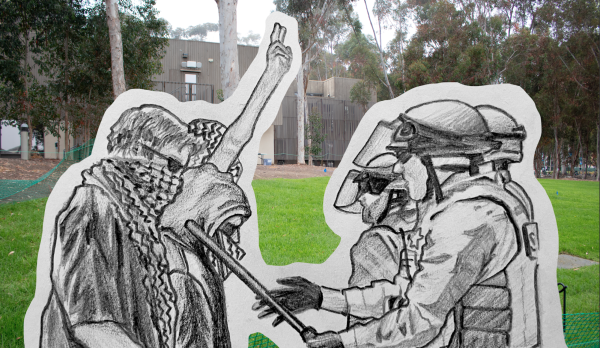
Police approached the group and removed people from the line one by one.
“What the cops would do is that they have an inner ring of cops and an outer ring of cops. And they would like to deliberately pick someone to take away and arrest. … They would have someone from behind come out and try to break the link. And then they would take the person back and put handcuffs on them.” – Gertrude
“They would have five to ten people target one person. After they pry the board, they would retreat and wait a couple seconds, [then] they would brace their batons, charge again.” – Bartholomew
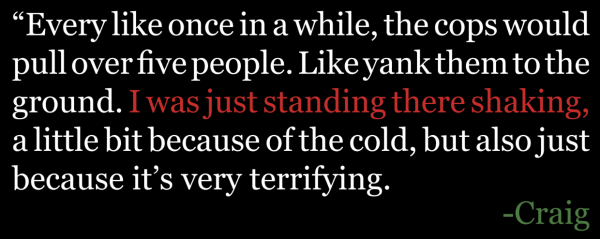
“You would hear banging, and you’d turn around, and that’s how you know that someone else was taken. … All I could hear was bodies banging against the table, because the police were pushing them onto the table and yanking them away.” – Sunflower
“It was pretty clear that they were strategically picking people out … so I’m assuming they were choosing people out in terms of who they thought were weaker or the most vulnerable, in terms of where the line was at.” – Redacted
“At least at that time, I had a feeling they weren’t going to be too rough with us. They obviously proved that’d be different, that I was wrong.” – Lølø
“I definitely think there were a bit more biased actions that they used towards certain people. … They were slightly more humane towards some people that were more white-appearing, as opposed to those that were not. Whether that’s once they saw your name or the actual color of your skin.” – Redacted
“The cop was like, ‘We’re coming for you next,’ and he points at me because I have a little shield thingy. Then he’s like, ‘Drop the shield,’ and I’m like, ‘[F—] no!’ and so they end up rushing towards me. I try to like John Wick it outta there and like he hits me and the girls [next to me] aren’t holding on … so I kind of roll, or like fall, on the table behind me, and I land in a bunch of curry. … I try running but they just end up jumping on me.” – Mike
“I distinctly remember one of the cops right in front of me, pointing at the American flag on his uniform seconds before they ripped the plywood away from us.” – Joe
“I held on to that [f——] board for dear life, and then the [f——] cop was trying to yank the board, and I was like, ‘No,’ and then he was like, ‘Don’t resist, let go, let go,’ and I was like, ‘You know what? Fine.’ And he broke my [f——] nail.” – Mildred
“I was just feeling a feeling of terror and disgust. I was looking at the cops’ faces like, ‘This is what you’re doing? Like this? This is what you’re spending your time doing?’ Just doesn’t make sense.” – Craig
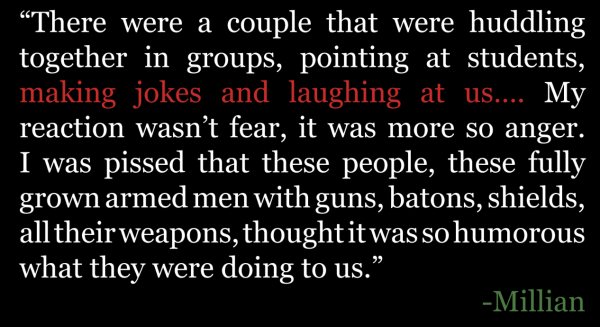
“It felt terrible. It made you feel weak and small and powerless. And that’s the point. That’s why they did it. I was sure [that] part of it was about clearing the encampment; I’m sure Khosla was definitely afraid of tents. But it was mainly about sending a message. I think that was the biggest thing. They were hoping that it would drive a stake right through our hearts and in fear and spread fear and panic.” – Nava
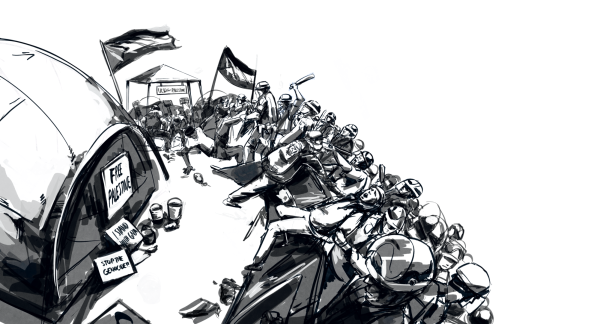
As police removed encampment members from the line, they put them in zip ties and handcuffs.
“They put [the zipties] on when I was flat on the ground, in the dirt, had my hands behind my back. I knew there was no point, but it just kind of lifted me up and took me on my way.” – Craig
“The girl to my left gets pulled, but she tugs on my arm, so they took that as resistance and pulled her to the ground. I know her, and she’s a really nice person, and she’s really gentle and sweet. And knowing that a 6-foot cop just yanked her to the ground broke my heart.” – Alfonzo
“When they put me in cuffs, what immediately came to mind was the mass graves that they found in Gaza, people who were found wearing the exact same cuffs that were found dead and buried there. So I wasn’t scared of anything that police or school could do to me because it’s nothing in comparison to what other people are currently experiencing — what the martyrs in Palestine experienced before they died.” – Millian
“When I was in [zip ties], I walked past Geisel, and I just saw all these memories of Geisel, like when I was a first-year and all the moments I had there and realizing I’m a student. Like I’m a student getting arrested on my campus; this is insane.” – Alfonzo
The first arrestees were escorted from the encampment site to begin processing at the Trove, and all those arrested were later taken to Price Center.
“Even when we were arrested, we were just talking with other people, elevating your spirit more than the handcuffs in your hands could hold it down.” – Edwin
“I was standing there … and I looked over at my friends that were arrested. And for the first time, I see their faces. And I see [my friend’s] his face for the first time, and I start bawling. He just had this smile that was like, ‘We’re gonna be okay. We did the right thing.’ He didn’t even say anything.” – Sunflower
“When we were all being arrested, being handcuffed, I was constantly trying to check in on people, making sure people were okay, trying to lighten the mood with some jokes, or something. So it was only a brief period of time where I was like ‘Holy [s—], we’re getting arrested.’” – Lølø
“I was mostly just like, ‘I can’t believe that we are the threat. We’re the bad guys, the ones making campus unsafe.’ And the way [the cops] looked at us could almost make you believe that you were the bad guy.” – Sunflower
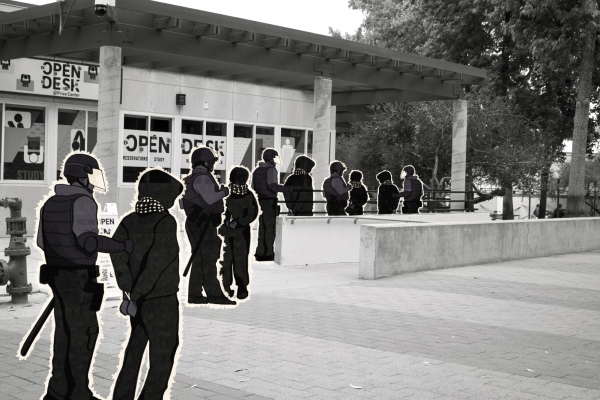
Those arrested were then detained in the East Ballroom for a number of hours, where they continued processing. Police and UCSD administrators took headshots of the arrested students, recorded their information, and presented them with their charges.
“Walking through [the East Ballroom] and seeing the whole setup that was they had stations they had signs already written. They had computers set up. It was kind of startling to see how prepared they were. … It’s just like another event; they have stations where photos are taken, like they have stations where IDs are taken, and it’s very weird. They had been preparing for this, I’m sure, for a few days.” – Craig
“They had taped over one of the Salon 101 signs with a piece of paper that said ‘processing.’” – Millian
“There’s the [news ticker] headline thing in Price Center, and I saw [a headline] about the encampment there while we were waiting. And I was like, ‘Holy [s—]! That’s us.’ … Sometimes, I’d just stare at it for whatever reason, but this time, I was actually in it, and then, it was actually talking about what was literally happening to me right then, which was pretty surreal, not gonna lie.” – Lølø
“I’m like begging hella cops. I need to pee so bad because we just got woken up. I’m like begging every cop that walks by like, ‘Please let me pee, please let me pee.’” – Mike
“There were so many different cops, and they all looked like they didn’t quite know what to do.” – Jordan
“Someone who sat near me when we were all [in the] Price Center Ballroom … I could see there was a bunch of dirt on him, so clearly, they had taken him to the ground. … I feel that maybe they cuffed him too tightly; it was causing him pain in his shoulders and his armpits.” – Lølø
“Someone’s wrists were turning purple because of the zipties.” – Skylar
Arrestees were moved downstairs and onto unmarked vans and San Diego County Sheriff’s buses parked at Price Center Loop. The first group of arrestees were loaded onto vans and taken away. The remaining arrestees were met with a group of protestors outside, who attempted to stop the buses from leaving.
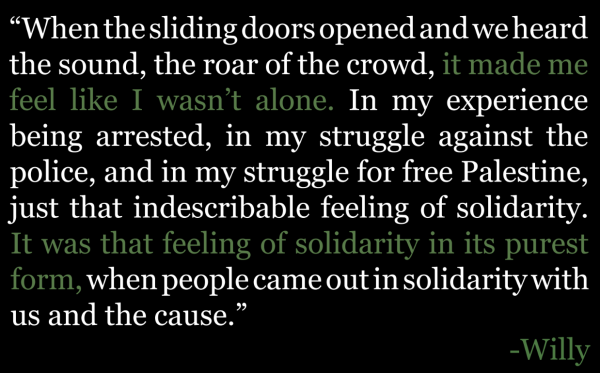
“I remember I was walking out of Price Center and just being greeted with so many smiles and so many people. As much as there were smiles, there were tears too.” – Skylar
“For me, it was very inspiring that this many people had shown up. I feel like I didn’t anticipate that there would be such an effort to stop it … such an outpouring of community support.” – Jordan
“We were loaded onto the bus. I managed to sit with my friends. Then we caught sight of our other friends … protesting, like, holding up peace signs. We couldn’t hear them that well, but they literally told us that they were screaming so loudly they had lost their voice for like days after. When we saw them, all of us burst into tears.” – Gertrude
“I never in my life would have expected anything like this at UCSD, just given our reputation as a student body. But, I know it was like surreal but also heartwarming because the crowd was there for us — trying to get us released — and I know most of the people cried on the bus.” – Pikachu
“We see people getting pepper sprayed. … We see people getting hit with batons. … We were like, ‘Damn, this is even worse than what happened to us.’” – Mike
“Seeing [people getting maced] was just another level of a slap in the face. I think that might have been the most infuriating thing of the whole thing actually — seeing the police brutalize people.” – Bartholomew
Once the vans and buses left campus, arrestees were taken to Downtown Central Jail and the Las Colinas detention facility, separated by sex. Inside the jails, arrestees were further processed and taken to various holding cells.
“It was a lot to take in … and also the fact that we were being [taken] to jail. It was pretty emotional. It was really touching to see everyone [came] out for us.” – Pikachu
“I think everyone felt a little weird once we were gone from all the energy of the protest.” – Jordan
“Then they took us to the downtown jail. And once we parked there, we could hear music playing from the front of the bus – I can’t remember the song…. but it was like ‘don’t worry about a thing.” – Joe
“We were sitting in the parking lot for a while. And then we went inside. They had us do mug shots. And then they took our pulse and stuff, which is a little crazy, like taking your pulse in a situation where you’re gonna have an elevated heart rate.” – Craig
“There were a bunch of weird microaggressions with us being nonbinary. They would be asking these normal, polite questions, but then you could hear them laughing around the corner…. They called us non-genders at some point; it was kinda funny.” – Skylar
“We went into a holding cell where some people were able to make phone calls. I was not able to make a phone call. We were given bread, peanut butter, jelly, and expired milk. Yes, that’s the food that we were getting. It wasn’t great. It was something.” – Craig
“We were all so tired that we fell asleep on the concrete, curled up in a ball.” – Sunflower
“Some people were scared, some people were really sad, some people were kinda just like, ‘It is what it is.’ But we were all proud of standing by and holding down the fort.’” – Mike
“Each time we were moved to a new room, we thought they were going to let us go, but then we were put into another room. I was just hungry and angry at the time. We were in the room for so long. We were super bored, thirsty, and like, the only thing keeping me through it was the fact that I was going to be released before the end of the day.” – Pikachu
“Some people got food, some people didn’t. Some people’s food that they got was bad; there were cartons of milk that I think were bad. But, you know, for the most part, honestly, all the guards and stuff were respectful, they were lowkey joking around with us.” – Lølø
“The jail was definitely the worst part of the experience for me. … The officers in the [jail] were much more aggressive than the ones who came to campus. They were always yelling, like ‘Walk!’ … ‘Hands behind your back!’ … ‘Face the wall’ … as if we were dangerous criminals.” – Pikachu
“The cops overall saw us as criminals. They saw us as if we just committed a crazy crime because they were treating us as such. They were rough with us, really pat us down, really close … like, uncomfortable.” – Alfonzo
Arrestees were released in waves throughout the afternoon into the evening.
“It was still kind of surreal. But obviously, I was glad to be out. I really just wanted to go home; I wasn’t really thinking about much else at the time. I was a little bit annoyed because people were immediately rushing to us and being like, ‘Cover your face because of the reporters,’ but I was grateful to be out.” – Pikachu
“I was also harassed by the media as I was coming out. I was having a very lovely moment with my family. And then a dude came up to me just like, ‘Hey, what are your charges? What are you doing?’ Afterward, I was also so paranoid for the rest of the day.” – Craig
“When my friends ran up to me and hugged me… it was so much relief that it was over.” – Joe
Interviewees described their time in the encampment for the five days before May 6.
“There was so much art, music, and love.” – Sunflower
“Everyone’s sharing resources. No one’s being left hungry.” – Craig
“There was a lot of community there. … It was really safe, and there was, you know, like people living their little commune life. And it was super educational; there were so many opportunities to learn different things.” – Redacted
“It was so cool to see how we created our own society within a few days.” – Bartholomew
“This was one of the first real, genuine social spaces where I made actual lasting connections with people that I still talk to.” – Nava
“UCSD is always screaming community, inclusivity, and diversity, but we never really felt it. … We just saw it as a face front. But in that encampment, we actually felt community.” – Alfonzo
“I think for a lot of students, it was their first time experimenting with what critical people power was like. And so for a lot of folks, I think there was excitement; there was energy that was really healthy in many ways.” – Husayn
“I felt so honored for who I was there. Even though I wasn’t in school, I learned so much. … It was invaluable.” – Sunflower
“For me, it was like the first time where I actually felt like, ‘Oh my god, there’s like people here who want to build community,’ because I feel like UCSD, as a campus, doesn’t have that inclination. I feel people were very open, especially because we were all going for a certain goal.” – Blue
“I’m leaving the experience with so many more friends than I entered with. I got to make conversation with people who I never would have otherwise connected with from all different walks of life and backgrounds.” – Millian
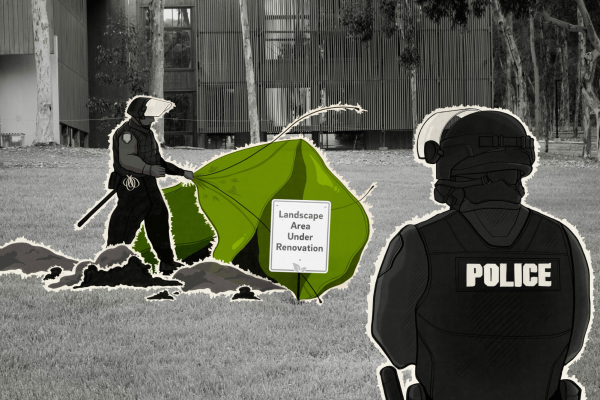
Since May 6, arrested students have returned to campus. In their interviews, they reflected on their experience at the encampment and in the weeks that followed.
“My first day back on campus by myself … I remember I was just breathing really heavily and having to try to keep myself calm. I remember just feeling very overwhelmed and super overly conscious, too.” – Redacted
“I’ve been struggling to get back to doing actual homework. It feels weird to do anything at all. It seems not important compared to everything that’s happened and everything that’s currently going on … as like a genocide is unfolding. It just seemed very surreal. To witness spaces being turned into vessels for violence, and then witnessing those vessels for violence being turned back into public spaces. Kind of weird.” – Craig
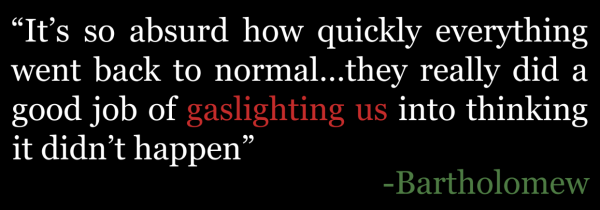
“The first time I went on campus, it was really strange. I was really affected by little signs of people acknowledging what happened.” – Jordan
“I looked over where there used to be lights, posters, songs, dancing, so much love, tents, people, energy. And it was dead. … It was all gone. I felt like I could hear it all. I think that moment hit me the hardest.” – Sunflower
“If I take a moment to think that the encampment was there. … It took up so much room. It had a life of its own. It was a completely different experience than was happening [on] campus. Seeing it be completely gone was strange.” – Jordan
Each interviewee reflected on what the encampment, its dismantlement, and the wider movement means to them.
“All of this is nothing compared to why we were there, why we decided to do what we did. It feels like everything that’s working against us at the moment is just a reminder that, not only do these institutions that we pay tuition and pay taxes toward, not only do they not care about other people, they don’t care about us. Not only do they not care, but they’re willing to inflict violence on us for exercising our right to speak up and speak out. It’s actual directed violence toward the people that these institutions are supposed to be serving.” – Millian
“I was immensely proud of the amount of work that people were putting into this. I think it’s very apparent when someone actually has a passion and actually cares about something; they put that amount of energy into it, and they put themselves into the effort. Watching students do this for the first time, I was very proud of how they were handling it.” –Husayn
“I do believe in people organizing because I believe that people have power to make change, gradually or in any way that we can. And I think that change has to be seized in a very resistant way. It can’t just be handed to you; you have to do something somewhat outrageous, somewhat punishable.” – Mildred
What can we do to make sure people don’t forget, so all of this doesn’t get washed to the side? … I hope that people find a way to keep fighting.” – Jordan
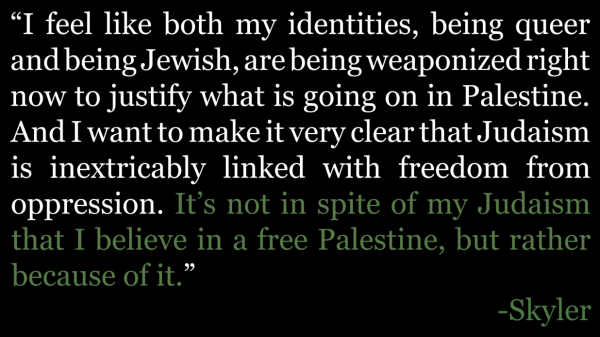
“No moment in my life has changed me, my fundamentals, and my outlook on the world more [than] when I got arrested.” – Sunflower
“I’ve still been very emotional about this. It was completely peaceful. We weren’t blocking anything. Who the [f—] uses that grass lawn, anyway? I think it was genuinely something good at the school. And it just kind of goes to show how far the school will go to defend the status quo and their position.” – Nava
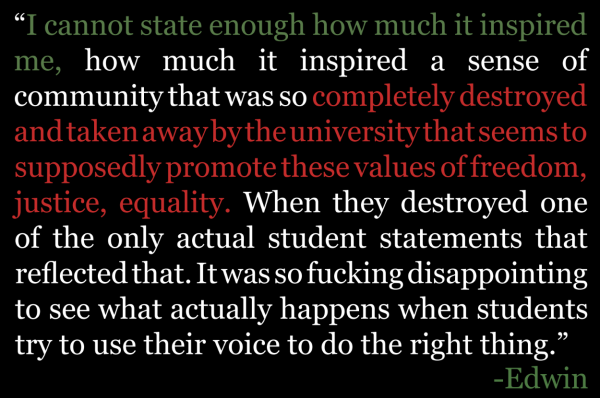
“It is a bit surreal to have it happen, even though it was something I knew was going to happen anyway. It’s still weird … to exist in that space and not just see it on TV or on the internet.” – Lølø
“It feels like my life has been put on pause.” – Willy
“It’s a stark contrast between peaceful protest versus police brutality.” – Blue
“Whether you were involved in the encampment or not, so many people have been directly impacted by what happened, and you feel unsafe. And to know that they just don’t care about such a vast part of this community on campus is just really sad.” – Redacted
“I’ve never seen a protest so quiet; it was really just more of like … straight up a community. In like zombie movies, when they run into a shelter or something, and it’s just a bunch of tents, and it’s a community. … That’s deadass what it felt like. Nothing was violent.” – Mike
“Seeing all of the other campus protests all over the country inspired me to come when UCSD had one. … I was concerned with the police crackdown on these protests and the right to protest and free speech. And it’s clear that they don’t want us to have that — the university, the cops.” – Pikachu
“Seeing that people were actually upset about it made us be like, ‘Ok, it was worth something. Us doing this actually did something.’” – Bartholomew
“I remember I was walking to the bus, and there was a woman. Her family was Palestinian, and she had talked to the camp when we had set up. And I remember she was there, and she was pointing at each of us saying, ‘You’re a hero, you’re a hero.’” – Gertrude
“There is a power in coming back [to campus] and being like, ‘I’m going to continue to work and continue to go to school.’ I have more power of being like, ‘I’m here again, and I’m still here.’ … Knowing that they see me as resistance, I take pride in that.” – Alfonzo
“We must not forget that we were doing this for the people in Gaza. We can’t forget that.” – Craig
“We were all [asking each other], if you guys had known that the cops were gonna raid, would you do it again? And everybody said yes. Immediately.” – Joe
The following section is an abridged recount of the Guardian’s coverage of the encampment from May 1st through 6th. Find a photo gallery and link to more information for each day.
MAY 1ST
A group of UC San Diego students and community members gathered on the green along Library Walk to set up an encampment in response to Israel’s ongoing genocide of Palestinians in Gaza and the University of California’s failure to divest funds from companies with direct ties to the Israeli military and condemn its actions. To read more about the first day of the encampment, please visit this link.
MAY 2ND
The Gaza Solidarity Encampment entered its second day of operation with no major disruptions reported. UCPD and UCSD administrators continued to be present in the area. To read updates about day two of the Gaza Solidarity Encampment please visit this link.
MAY 3RD
Protestors held a “Gaza Solidarity Press Conference,” where various speakers in support of the movement shared messages of solidarity with the crowd. Protestors played an unreleased song about Palestine by artist Macklemore. They cheered when the lyrics “Palestine be free,” “Free Palestine,” and “[F—] the police” played. The day concluded with a movie night on the green between Price Center and Library Walk. To read updates about day three of the Gaza Solidarity Encampment please visit this link.
MAY 4TH
The protestors expanded the encampment north toward Geisel Library and into the trees while chanting. An organizer announced that the administration was attempting to dismantle the encampment. Members of the administration were at the entrance of the encampment talking with participants. The organizers encouraged the crowd to gather near the camp’s entrance and chants began, “Disclose, divest, we will not stop, we will not rest.” To read updates about day four of the Gaza Solidarity Encampment please visit this link.
MAY 5TH
Chancellor Pradeep Khosla sent out an email stating that the encampment had become “dangerous” and calling on participants to “peacefully disperse.” At approximately 3:00 p.m. on May 5, a group of counter-protestors gathered at the end of Hopkins Lane to take part in a “Pro-Israel Solidarity Rally.” To read updates about day five of the Gaza Solidarity Encampment please visit this link.






